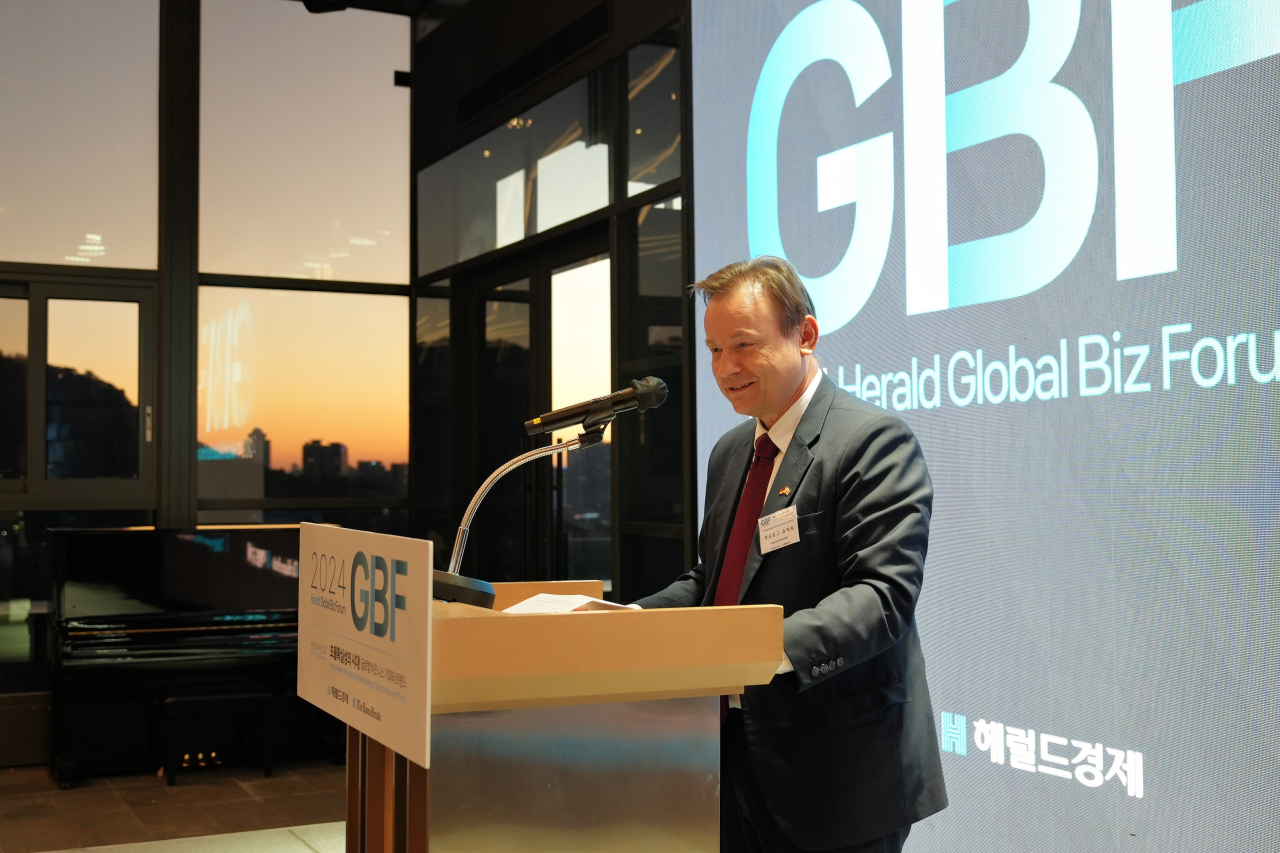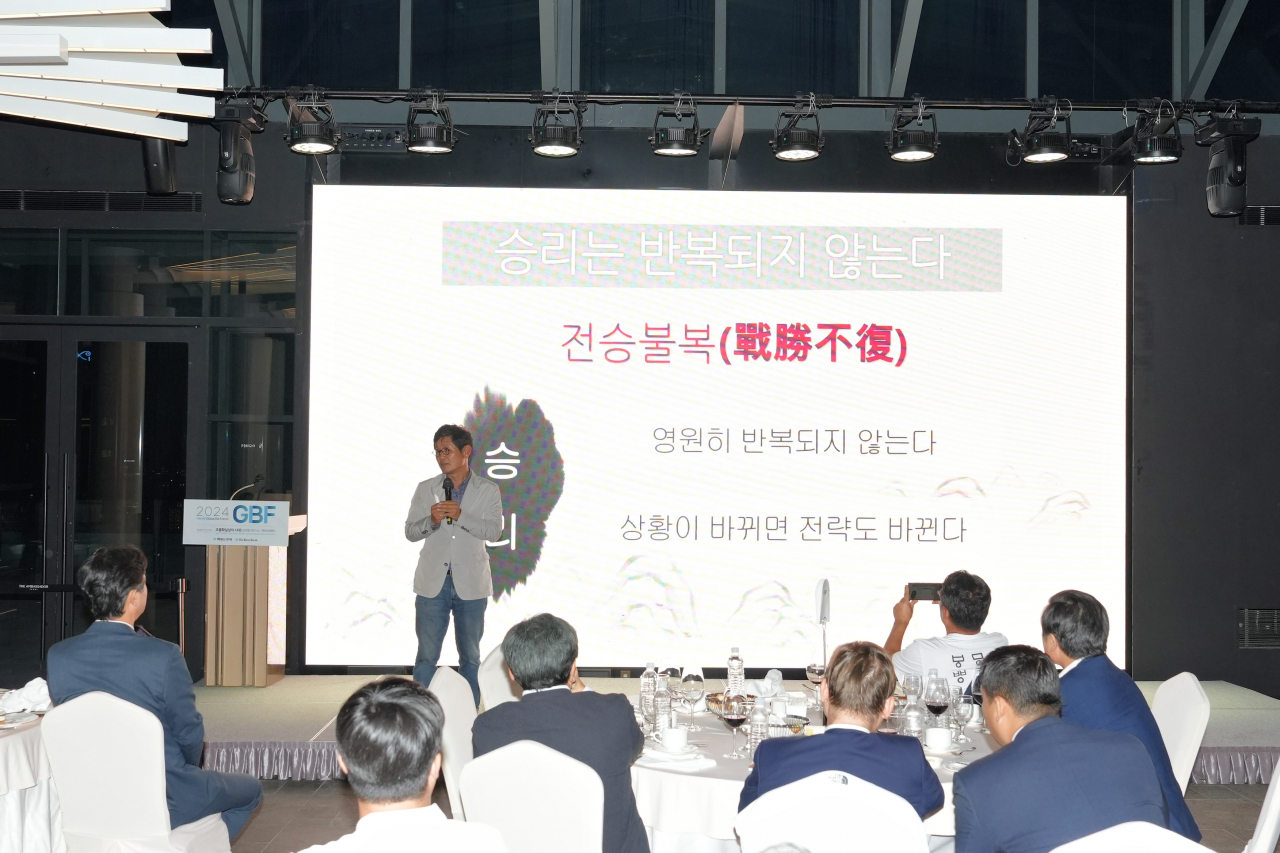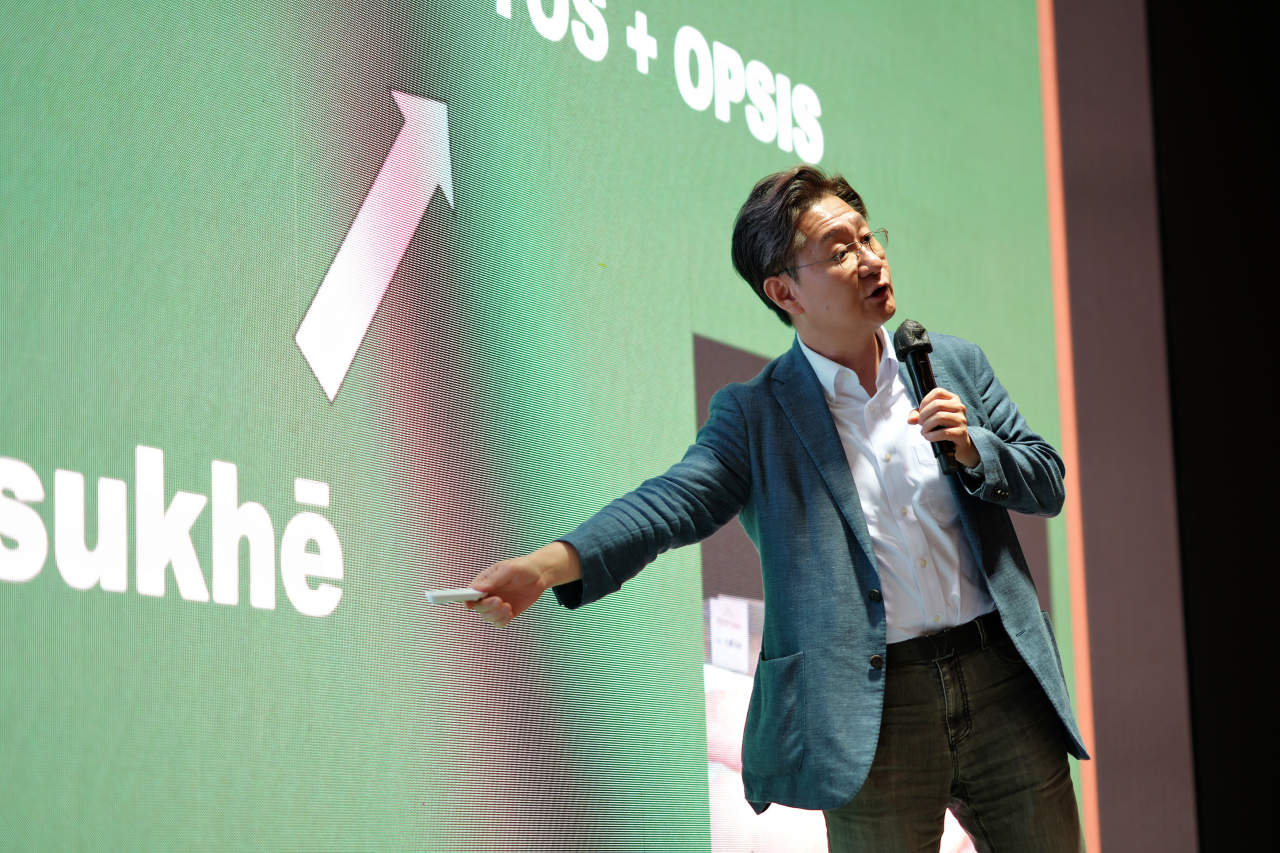 |
German Ambassador to Seoul Georg Schmidt delivers a welcome speech at The Korea Herald’s Global Business Forum in Seoul on Wednesday. (The Korea Herald) |
German Ambassador to Seoul Georg Schmidt highlighted the growing complexities and opportunities in a world in flux during a session of the Global Business Forum on Wednesday.
Addressing the weekly forum of local CEOs and leaders from various fields, the diplomat touched upon a wide array of pressing issues — from Germany’s energy revolution and the rise of artificial intelligence to demographic shifts and global security, as he emphasized the need for innovation and international collaboration to navigate the uncertainties.
He began by addressing Germany's transformative shift in energy production.
“Germany is in the middle of a huge change,” Schmidt said, referring to the European nation’s commitment to moving away from oil and gas and embracing renewable energy sources. Despite initial skepticism, Germany how generates more than 50 percent of electricity it uses from renewable sources, he explained.
“It’s not just about the environment, but also security,” he continued, pointing to the current instability in the Middle East and Europe with relation to fossil fuel supply. “People can turn off your oil, people can turn off your gas,” the envoy said, referencing Germany’s experience with Russia’s energy embargo during the ongoing Russia-Ukraine conflict. However, as Schmidt noted, “Nobody can switch off your wind or your sun.”
In addition to energy transformation, Schmidt highlighted the ongoing revolution in artificial intelligence. “We talk a lot about the AI revolution. It’s a huge change, and there will be winners and losers,” he said.
While German industry is strong in AI, Schmidt noted that Germans may be more conservative than their South Korean counterparts when it comes to adopting AI technologies in everyday life. “We care more about data protection and security,” he said, mentioning that Germany prefers to take a slower approach to integration, drawing a comparison with Korea’s heavy reliance on IT services like those offered by Kakao.
Schmidt’s speech also touched on one of Germany’s most pressing issues: demographic change. Despite a declining birth rate -- reaching 1.36 in fall 2023 -- Germany has managed to stabilize its population through immigration, a sensitive, important topic in many parts of the world, especially Korea, which has the world's lowest birth rate of 0.72 in 2023. “We know immigration is a very emotional topic,” Schmidt acknowledged, adding that it is essential to create a society where "everybody can be German" while also respecting German laws.
The ambassador also noted the strong historical connection between Germany and South Korea, recalling how half the thousands of Korean nationals who emigrated to West Germany as nurses, miners and others in the 1960s stayed and have since made it their home, becoming Germans. This long-standing relationship serves as an example of how countries can manage demographic shifts through immigration.
Tying back to the forum’s theme, “Age of Hyper-Uncertainty: Global Business Opportunities and Trends,” Schmidt drew attention to the global geopolitical landscape. “We have worries inside our house, and on top of that, we have worries outside our house,” he said, referencing conflicts involving the US, China, Israel and Russia. He noted the direct connection between Germany and Korea’s security concerns, pointing to North Korea’s testing of weapons, which could one day threaten the Korean Peninsula.
In conclusion, Schmidt painted a picture of a world in flux but also full of potential. As nations like Germany and Korea navigate these turbulent times, there are opportunities to innovate and collaborate, particularly in the realms of energy, technology and immigration.
In addition to Schmidt’s address, the forum featured prominent speakers from various fields.
 |
Park Jae-hee, head of Seokcheon Academy, delivers a lecture on strategy and innovation based on the principles of "The Art of War" by Sun Tzu during the weekly Global Business Forum in Seoul on Wednesday. (The Korea Herald) |
Park Jae-hee, head of Seokcheon Academy, delivered a lecture on strategy and innovation based on “The Art of War” by 6th-century Chinese thinker Sun Tzu.
He emphasized the importance of adapting to change in a rapidly evolving world.
Forensic scientist and professor at Seoul National University School of Medicine Yoo Seong-ho delivered a lecture on life and death, the process of aging and the issue of assisted death.
 |
Forensic scientist and professor at Seoul National University School of Medicine Yoo Seong-ho gives a lecture to the participants of the weekly Global Business Forum in Seoul on Wednesday. (The Korea Herald) |
The GBF, organized by The Korea Herald, is an association of experts from various fields such as business leaders, scholars, diplomats and celebrities, who come together every Wednesday for lectures and exchange of their views and ideas on industrial changes.







![[Weekender] Korea's traditional sauce culture gains global recognition](http://res.heraldm.com/phpwas/restmb_idxmake.php?idx=644&simg=/content/image/2024/11/21/20241121050153_0.jpg)